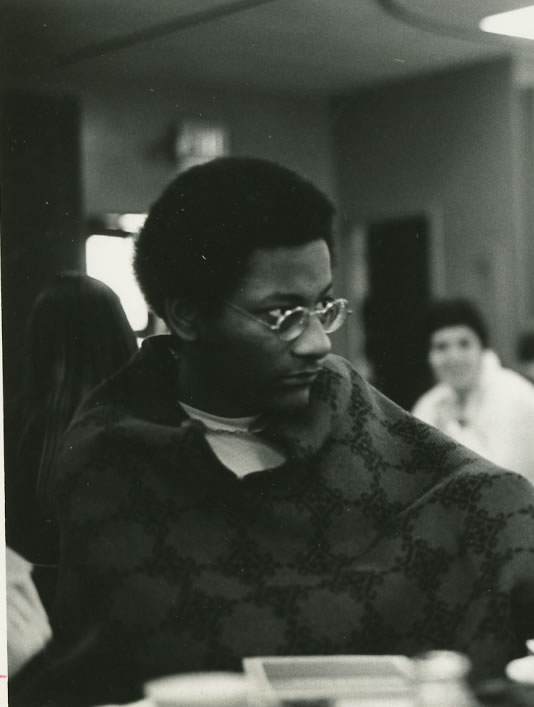
A BSU member in the 1980s
In the late 1960s and early 70s, Vietnam War protests, the civil rights movement, and calls of rebellion in the names of peace and love or violent revolution were occurring all over the United States. Students at Middlebury were caught in the midst of this national and world -wide conversation, and felt that these issues deserved to be examined in context to the small rural Vermont community in which their own education was the key reason for its formation and continuation.
Black students on campus, a small minority in a largely white and affluent school, made it clear that they wanted their perspectives and voices to be heard during this time period. Many felt that the student group BSMU, (or Black Students for Mutual Understanding, founded in 1967), was an important platform for expressing their ideas. In the aftermath of the assassination of Rev. Martin Luther King, on January 29th 1969, a special committee addressed then president James Armstrong on issues regarding race on campus that needed to be examined. Attached to the committee’s letter was a Statement of Black Students, written by individual authors in conjugation with ideas discussed in BSMU meetings. The Statement’s recommendations include these:
“The admissions policy should be directed in such a manner as to create an opportunity for more Black students to attend Middlebury. This could be achieved by setting up communication with predominately black secondary schools throughout the nation…
“A summer remedial program could be established. This would be for potential students who have been accepted here but do not have the solid academic foundation many students here get from private secondary schools.
“There is no reason why Middlebury College should not have black representation in the faculty.”
One interesting section contains a student’s feelings on being a black student activist on a white majority campus:
“Middlebury’s greatest contribution to the crisis of race and poverty must be the white and relatively affluent students who comprise and probably will comprise the bulk of our student population for many years. What these young people do today in College, tomorrow in their careers and what the College does to them in shaping their values and experience in these areas will constitute Middlebury’s most important role in service. There can be no solution to “the black problem” without solving the much greater “white problem:” It is in the area of the “white problem,” however, that the committee has the least power to effect results…[student organizations] needs volunteers, the ghetto needs medical and legal content, the nation needs informed and enlightened citizens– the committee can commend these goals for students but not command them. Individual students and the various campus organizations from sororities to student government can, by taking thought and effort, accomplish things that the institution can never do.
Black activism on campus was not solely done through written requests to the institution. Notes from a BSMU meeting on April 11th, 1969, a year following the special committee’s report, acknowledged that some members thought the college had “done a lot” to address issues surrounding race but much progress was still to be made. Some black students thought that the only way to achieve real change was “to play it tough, hard, and pushy, otherwise the whites will walk all over you.” Following this declaration, in regards to failed promises by the administration to give more financial aid money to “disadvantaged” students, the BSMU announced “no threat to occupy Old Chapel was made, but… the [they] planned this if their demands were not met.”
A year later, during the student on-campus strike following the assassination of students at Kent State University, the BSMU made sure that voices of Blacks and other minorities were heard in the student body’s conversations. From the Strike Bulletin on May 6th, 1970, student Arnold McKinney is scheduled to speak about the harassment of the Black Panther Party in Oakland, CA. In addition, alongside a list of demands that include the end of the Vietnam War and a halt to “University complacency with the Military,” is a statement “in sympathy with the imprisonment of the Black Panthers.” A BSMU position paper contains ideas about the Strike pertinent to Middlebury’s black population and is meant to be read and understood by the larger school community. Regarding the Kent state issue, it reads:
“The death of the four Kent State students was a very tragic event for Kent State and the parents of those students. However it would be hypocritical of this organization and its members to pretend that these deaths have rendered us emotionally bankrupt, for many of us and the vast majority of Black people, death and suffering has become a very part of life… For Black people the problem of death is part of the sobering reality of our survival.”
The BSMU would morph into the Black Student Union, which was active on campus for many years to come, and is now replaced by the AAA, or African American Alliance.
Here is a scan of the original position paper issued by the BSMU during the 1970 Middlebury student strike: studentstrikeBSMU